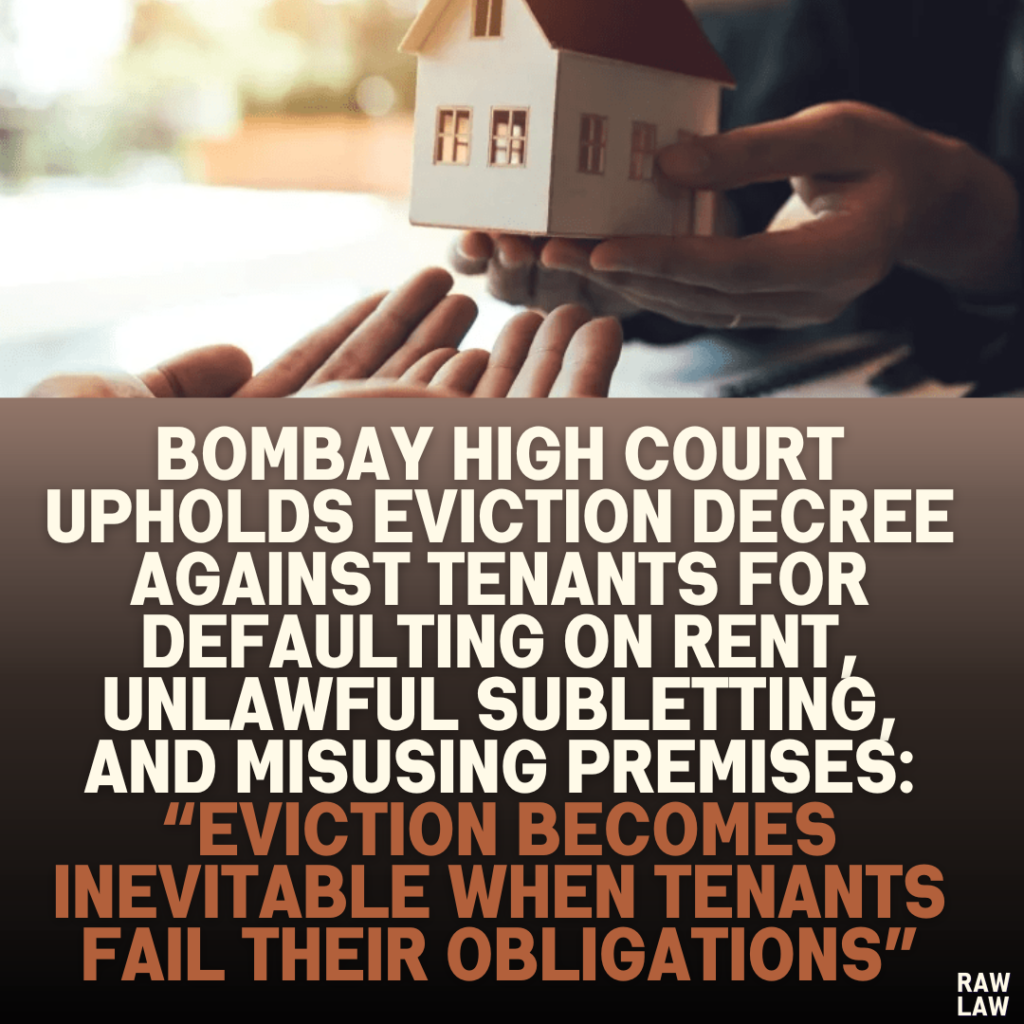Court’s Decision
The Bombay High Court dismissed the Revision Application filed by the tenants challenging their eviction decree issued by the Small Causes Court and confirmed by the Appellate Bench. The court found that the tenants defaulted on rent payment, unlawfully sublet the premises, and that the landlord demonstrated a bona fide need for the property. The court emphasized that “a rent control law protects tenants only so long as they fulfill their basic obligation of paying rent and using the premises appropriately.” The court also imposed costs of ₹25,000 on the tenants for raising baseless objections about the maintainability of the eviction suit.
Facts
The plaintiff-landlord filed a suit for eviction against the tenants on the following grounds:
- Rent Default: The tenants failed to pay rent of ₹250 per month from January 2005 to December 2005.
- Unauthorized Alterations: The tenants allegedly constructed brick walls, iron beams, and a roof, altering the premises without consent.
- Change in Usage: The tenants converted the premises from residential to commercial use.
- Unlawful Subletting: It was alleged that the tenants sublet the premises to a third party without the landlord’s consent.
- Bona Fide Requirement: The landlord claimed the property was needed for starting a family business.
The Small Causes Court ruled in favor of the landlord, citing rent default, unlawful subletting, and the landlord’s bona fide requirement. The Appellate Bench upheld this decision, dismissing the tenants’ appeal.
The tenants then filed a revision application before the High Court.
Issues
- Were the premises exempt from the Maharashtra Rent Control Act, 1999, due to being situated on government land?
- Did the tenants default in rent payment?
- Was there unlawful subletting of the premises?
- Did the landlord establish a bona fide requirement for the premises?
Petitioner’s (Tenants’) Arguments
The tenants raised the following points:
- Exemption from Rent Control Act: The premises were constructed on government land, making the Maharashtra Rent Control Act inapplicable. They cited Section 3 of the Act.
- Rent Payment Compliance: They claimed to have deposited arrears with the court within the stipulated time, as required by law.
- No Unlawful Subletting: The partnership deed with a third party, cited by the landlord, was genuine and did not amount to subletting.
- Lack of Bona Fide Requirement: The landlord had alternative premises, and his children were too young to require the property for business.
Respondent’s (Landlord’s) Arguments
The landlord countered with:
- Applicability of Rent Control Act: The premises were not exempt as the tenants failed to show restrictive covenants in the lease prohibiting tenancies.
- Non-Compliance in Rent Payment: The tenants failed to deposit arrears along with 15% interest and court costs as required under Section 15(3) of the Act. They also committed multiple defaults during the proceedings.
- Unlawful Subletting: The partnership deed produced by the tenants was a fabrication to cover up subletting to a third party.
- Proven Bona Fide Requirement: The landlord lacked other commercial premises and required the property for his family’s business.
Analysis of the Law
- Maintainability of the Suit:
- Section 3 of the Maharashtra Rent Control Act exempts premises on government land from the Act’s protection.
- The court held that the tenants failed to prove that the landlord’s lease agreement prohibited subletting or creating tenancy rights. Therefore, the premises were not exempt from the Act.
- Rent Default:
- Under Section 15(3) of the Act, tenants must deposit arrears, 15% interest, and court costs within 90 days of receiving a demand notice.
- The tenants only deposited arrears and failed to comply with the other mandatory requirements, which justified the eviction decree.
- Unlawful Subletting:
- The partnership deed produced by the tenants was deemed a sham document created to mask subletting. The court found no evidence of genuine business operations under the partnership.
- Bona Fide Requirement:
- The landlord demonstrated the need for the premises, citing a lack of other commercial properties and the need for a family business. The tenants’ claim of alternate premises available to the landlord was unsupported.
Precedent Analysis
The tenants relied on:
- Union of India v. Ibrahim Uddin: To argue that adverse inferences cannot be drawn unless the opposing party fails to produce documents after receiving notice.
- Gundalapalli Rangamannar Chetty v. Desu Rangiah: To claim that subletting cannot be presumed as long as the lessee retains legal possession.
The court distinguished these precedents, noting:
- The landlord was not required to issue a notice to produce documents, as the tenants themselves presented the partnership deed.
- The tenants failed to prove legal possession or genuine business activity in the premises.
Court’s Reasoning
- Jurisdiction and Applicability:
- The tenants’ objection to jurisdiction was baseless and aimed at delaying proceedings.
- By questioning the landlord’s title, the tenants violated Section 116 of the Indian Evidence Act, which prohibits tenants from denying the landlord’s title after entering tenancy.
- Default in Rent Payment:
- Tenants failed to comply with Section 15(3), and repeated defaults during the suit justified eviction.
- Unlawful Subletting:
- The partnership deed was deemed a fabrication as the tenants failed to produce any supporting documents like financial records or operational proof.
- Bona Fide Requirement:
- The court accepted the landlord’s claim based on evidence, rejecting the tenants’ argument that the landlord had alternate premises.
Conclusion
The Bombay High Court dismissed the Revision Application, upheld the eviction decree, and granted the tenants time until February 28, 2025, to vacate the premises. Costs of ₹25,000 were imposed on the tenants for raising frivolous objections to jurisdiction.
Implications
This judgment reinforces tenants’ obligations under rent control laws, particularly the necessity of timely rent payment and adherence to statutory conditions. It also underscores that baseless jurisdictional objections will not shield tenants from eviction when substantive grounds like rent default and bona fide requirement are established.



